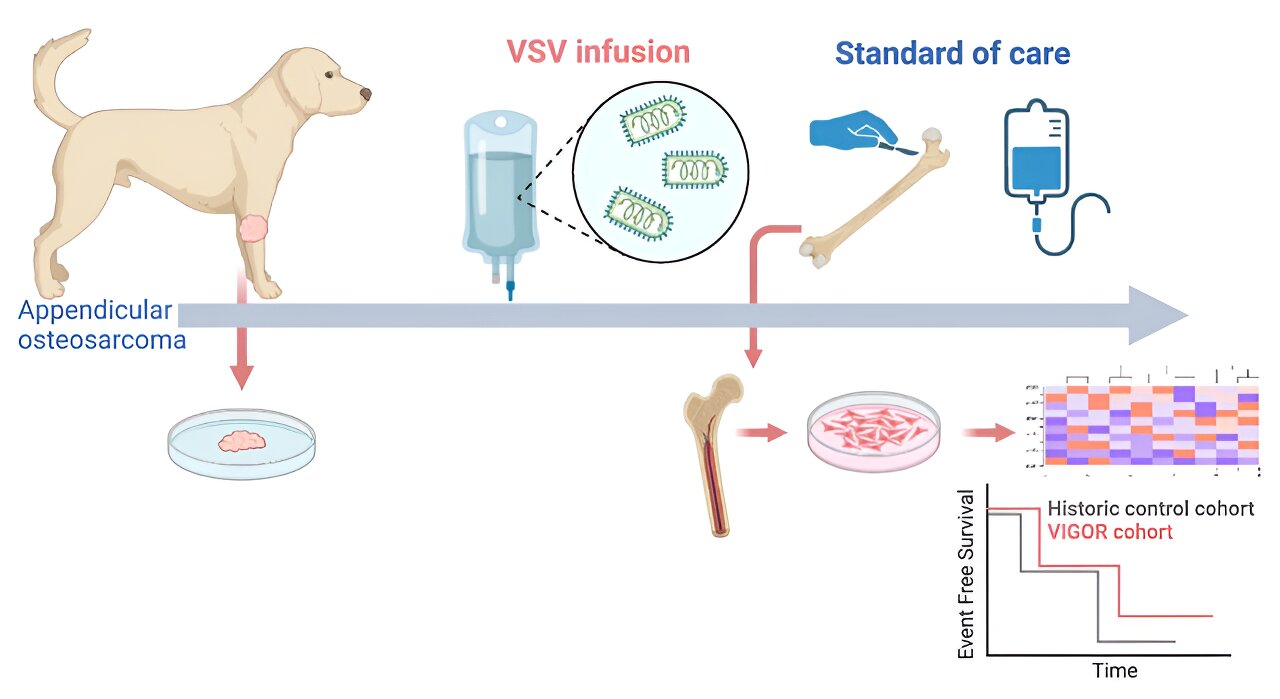

Researchers from the University of Minnesota partnered with Mayo Clinic to conduct a groundbreaking study that could offer hope for dogs, and potentially humans, diagnosed with osteosarcoma— a devastating bone cancer predominantly affecting children, adolescents and young adults.
The five-year survival rate for patients with osteosarcoma is about 60%. New treatments are desperately needed as the standard options have remained largely unchanged for more than four decades.
In a new study published in Molecular Therapy—Oncolytics, researchers in the U of M College of Veterinary Medicine employed an oncolytic virus engineered at the Mayo Clinic, to target and destroy cancer cells while also boosting the body’s immune response. The vesicular stomatitis virus (VSV-IFNβ-NIS) was administered systemically before the standard treatment, which typically includes limb amputation and chemotherapy.
Researchers looked at dogs diagnosed with osteosarcoma in one of their legs, providing a naturally occurring model that closely mimics the disease’s development and heterogeneity seen in human patients. The study’s objective was to target and eliminate cancer cells in both the primary tumor and any sites to which the tumor cells might have spread (metastases), induce inflammation within the tumors and stimulate immune responses against the cancer.
They found that systemic VSV-IFNβ-NIS therapy can be safely administered in the neoadjuvant setting to treat canine osteosarcoma. No major side effects were observed, and the VSV-beneficial effects could continue even after surgery and chemotherapy treatments. Cancer areas in the VSV-treated group showed more signs of inflammation—typically a good sign in fighting this type of cancer.
“Interestingly, the dogs that had evidence of an immune response within their tumors prior to treatment experienced prolonged survival times after receiving VSV in front of the conventional treatment,” said Kelly Makielski, an assistant professor of Internal Medicine at the College of Veterinary Medicine and the lead researcher on the study. “This includes some patients where the disease did not return more than five years after completing the treatment protocols.”
The research paves the way for further investigations into dose modification and combination therapy strategies for the treatment of sarcomas. The encouraging results from this study led to the development of several additional preclinical and veterinary clinical trials that are being conducted in both dogs and humans at the University of Minnesota and the Mayo Clinic. This approach offers exciting possibilities for improving clinical outcomes in both canine and human osteosarcoma patients.
“Utilizing viruses to trigger the immune system against naturally occurring canine tumors shows great promise in translating research from laboratory to patient care,” says Aaron Sarver, a researcher and assistant professor in the University of Minnesota Institute of Health Informatics.
More information:
Kelly M. Makielski et al, Neoadjuvant systemic oncolytic vesicular stomatitis virus is safe and may enhance long-term survivorship in dogs with naturally occurring osteosarcoma, Molecular Therapy—Oncolytics (2023). DOI: 10.1016/j.omto.2023.100736
Provided by
University of Minnesota
Citation:
Novel viral treatment found to be effective against devastating bone cancer in dogs (2023, December 7)
retrieved 7 December 2023
from https://phys.org/news/2023-12-viral-treatment-effective-devastating-bone.html
This document is subject to copyright. Apart from any fair dealing for the purpose of private study or research, no
part may be reproduced without the written permission. The content is provided for information purposes only.





